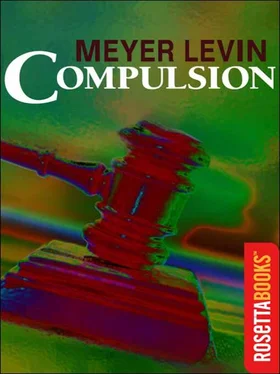And just where had he picked her up?
He gave the corner again.
Could he find her?
Well, possibly she hung around that neighbourhood. He was pretty sure he could recognize her.
“By the feel?” Padua cracked and they all laughed.
Padua resumed. And was there no one else to substantiate his whereabouts on that day? Judd smiled, as if to recognize that it sounded pretty fishy. But all the more reason for them to believe it.
“A lone wolf,” Padua said.
They went over the whole thing again, and again and again.
Horn, sitting on the edge of a table, remarked in a toneless voice, “Look, Judd, you see where that leaves us. Your family is one of the most respected in town. Now, we don’t want to prolong this. If there is anyone at all who can corroborate this account of yours, that would be a great help.”
For what happened at this point, Judd blamed himself. What made him bring Artie in, he never quite understood, unless it was a sense of fairness – he had been going through this ordeal for a couple of hours, and it was only fair for Artie to share part of it. Perhaps there was even a feeling that Artie would want to share the experience. And beyond this was a certain terror. Despite all their soft expressions, he had reached a stone wall.
“Well,” he said, “I wouldn’t want to involve anyone.”
They jumped on it. Surely it would simplify things if someone had seen him, been with him.
“Well, a friend of mine was along with me, but the fact is, his mother is a highly refined woman and it would be quite a shock to her to hear that her son participated in such-”
“-pastimes?”
He waited.
Padua asked, “You had another fellow with you when you picked up this girl?”
“Who was it?” Horn demanded.
He couldn’t back out of it now. “Artie Straus.”
Once more, the sigh of relaxation spread through the room. Judd hated baseball, but from way back in his Twain School days, when they had tried to get him into things by making him the baseball manager, he recognized the feeling among the men: the second out.
“Straus was with you when you picked up this girl?”
“Well, we picked up a couple. The fact is, we had some drinks, in the afternoon while we were watching for the birds.” Somehow that always tickled them. “And we thought we had a little too much on our breath to go home – it would show – so we went to the Coconut Grove for dinner, and then we drove around and picked up these girls.”
“Straus,” Horn repeated as he wrote down the name. “That the Straus Corporation?”
Judd nodded.
A low, appreciative whistle came from Czewicki.
“Can you give us his address?”
McNamara was already coming forward to take the slip of paper. “Say, that’s right across from the Kessler house,” he said. “Say, I know this Artie Straus – he gave us all that dope on the school teachers.”
“He’s been extremely interested in the crime,” Judd said. “His little brother was in Paulie’s class at Twain. And Artie is a kind of amateur detective.”
As McNamara left, Horn stood up, smiling. “How about some dinner?” he suggested, in the tone of a man who has done a good day’s work. “I’m starved.”
“I could eat,” Padua agreed.
To Judd’s surprise, Horn suggested they all go down to the dining room.
It was an amiable meal. Not once during that hour did they touch on the crime. Various law schools were discussed, and, as Judd had suspected, it turned out that Padua was a product of evening courses at a downtown school.
The University of Chicago’s law school was outstanding, Padua said – it would certainly have been good enough for him, without going off to Harvard.
“My father insists on Harvard because Harvard is the best,” Judd remarked. “That has always been his attitude. Buy the best.”
He said it inadvertently. He would not have wanted to antagonize them. And indeed, none of them seemed to take it as a bragging remark.
During that dinner, the feeling began to grow in Padua that he would soon understand this case. No such feeling had come to him with any of the other suspects. Now, with Judd Steiner, Padua had that unmistakable glimmering, the feeling that, even aside from the material facts of the case, the crime would become comprehensible.
Had the glint in his mind come from Judd’s remark about buying the best, always having the best? A pampered kid, a prodigy, a young man who had always had everything he wanted. How did that lead to the murder? And the ransom? To prove he could get something on his own?
Padua remained quiet while the conversation flowed into other channels. Judd was discoursing on ornithology now, explaining about the stuffed birds McNamara had seen in his room, throwing in Latin names of species, and mentioning some rare specimen he had discovered.
One of the squad, a sergeant named Fleury, said bird shooting was his favourite sport; he knew a fine lake in Wisconsin.
It wasn’t the shooting part, Judd broke in. He didn’t particularly enjoy killing birds, but when there was a scientific reason, the killing became incidental. He went on elaborating his point, his voice becoming somewhat clacky as his self-assurance mounted.
But once more, a word, a phrase, had glimmered for Padua. “… the killing became incidental.”
Toward the end of the meal, Judd wanted to go to the men’s room. He had been drinking a great deal of water – was his thirst a sign? As he arose, Fleury made an involuntary movement to follow the suspect, but Horn shook his head.
The moment Judd was away from the table, the discussion began.
“That was a pretty fishy story about those broads,” Sergeant Fleury offered, to make an impression on Horn.
Czewicki pursed his lips. “He’s a smart cooky. He had a whole week to fix up a better story, if he had anything to do with it.”
“I think he did it,” Padua said.
They all looked to Horn. “We’ll damn well find out,” he said, his voice rather shrill.
When the detectives picked up Judd, Artie felt excited to the point of elation. Of course Judd would get out of it, the bastard. Or were they swatting him? Judd couldn’t stand a scratch. He’d bawl. He’d confess.
Maybe the best idea would be to scram, right now. But if he beat it, the game would be up. What did the cops have so far? If they knew anything much, they’d have arrested him, too. Then, if it was only Judd, it could be the glasses. Or it might be only some more questioning about birding. That was it. The police were baffled. They were going over the same old ground. Judd had got through it once; he’d do it again.
Artie decided to go home and wait for Judd to call.
Suppose he beat it up to Charlevoix? That could be natural – merely running up there ahead of the Memorial Day crowd. And then, if he heard anything bad about Judd, he could jump into a boat, hide out among the islands. Go across to Canada, up to Alaska…
At home, Artie retreated to his room. Two hours had passed. Surely Judd was back from downtown. The little bastard was teasing him.
Artie phoned the Steiners. The maid answered. She told him in an anxious puzzled voice, Mr. Judd had come back with those men, but he had gone again.
“What?”
Yes, they had all come back, to look for Mr. Judd’s eyeglasses. Mr. Max had been home at the time.
“Did Max go with Judd and those detectives?”
No, Mr. Max had gone out to a social engagement, she believed.
Artie hung up. Still, it couldn’t be too bad, or Max would have gone along with Judd.
His mother was talking about the weekend at Charlevoix. Did he want to invite anyone special? Artie held back the news about Judd. He made all kinds of funny suggestions about Charlevoix. How about Fatty Arbuckle? There was a good man for a party!
Читать дальше












